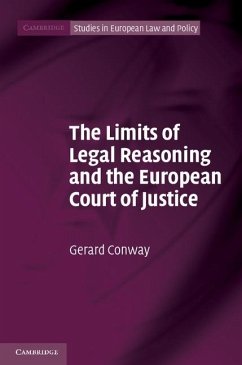The European Court of Justice is widely acknowledged to have played a fundamental role in developing the constitutional law of the EU, having been the first to establish such key doctrines as direct effect, supremacy and parallelism in external relations. Traditionally, EU scholarship has praised the role of the ECJ, with more critical perspectives being given little voice in mainstream EU studies. From the standpoint of legal reasoning, Gerard Conway offers the first sustained critical assessment of how the ECJ engages in its function and offers a new argument as to how it should engage in legal reasoning. He also explains how different approaches to legal reasoning can fundamentally change the outcome of case law and how the constitutional values of the EU justify a different approach to the dominant method of the ECJ.
Dieser Download kann aus rechtlichen Gründen nur mit Rechnungsadresse in A, B, BG, CY, CZ, D, DK, EW, E, FIN, F, GR, HR, H, IRL, I, LT, L, LR, M, NL, PL, P, R, S, SLO, SK ausgeliefert werden.









